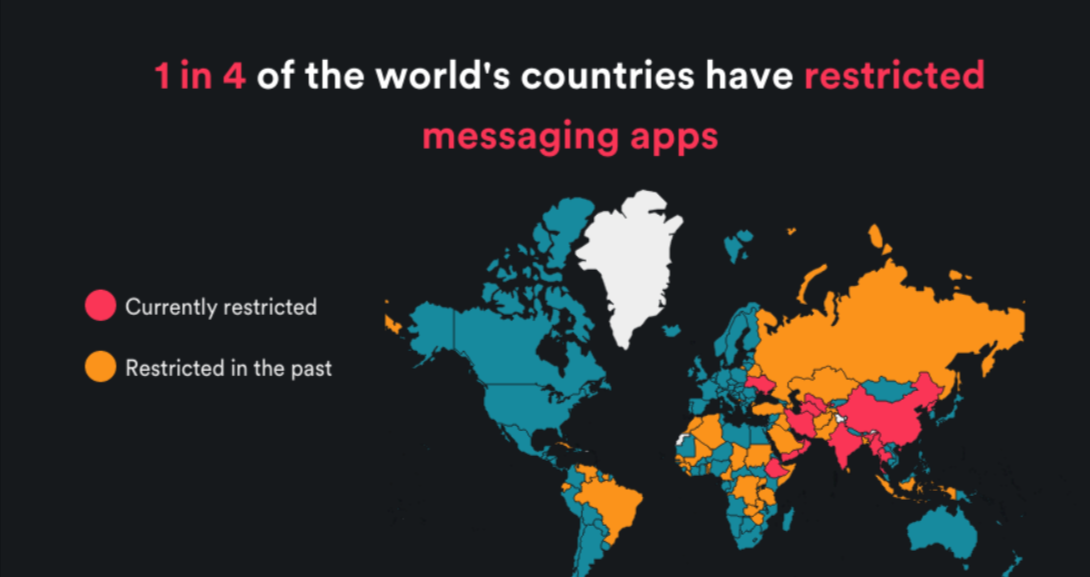Why Some Countries Are Banning Foreign Messaging Apps

A bunch of countries have cracked down on overseas chat apps. They're either putting tight controls on them or just straight-up not allowing them. These moves are about things like keeping the nation safe, making sure folks' private info stays private, and keeping a tight grip on politics. In a world where tech is a huge part of everyone's chats, blocking these international apps can shake things up for regular people, companies, and the big shots running countries.
We're gonna take a look at the reasons why some places are saying "no way" to foreign messaging apps. We'll dive into the main motives they've got for these bans, and how it's affecting folks who just wanna text and talk all over the world.
1. Why Do Countries Say Bye-Bye to Foreign Messaging Apps?
All over the map, governments are throwing out various explanations for banning foreign messaging apps, things like:
✔ National security worries
✔ Protecting user data and privacy
✔ Political and societal dominance
✔ Self-reliance in economy and tech
Different countries tackle foreign apps with various goals and strategies, but the main problem centers on data control and usage.
2. Main Motives for Blocking Overseas Chat Services
A. Safeguarding National Security and Guarding Against Online Dangers
The primary motive for blocking overseas chat services is national security. Authorities are concerned these applications:
Storing user data abroad makes regulating it tough. Foreign governments might use it to spy or keep watch. It could help with shady stuff like hacking spreading lies, or talking in secret for bad reasons.
Take China, for instance. They don't let WhatsApp and Telegram in 'cause they can't control 'em. They're all about WeChat though, 'cause it plays by their rules.
And then there's India. They nixed a bunch of Chinese apps, WeChat included. They were worried about their data and sneaky moves from across the border.
B. Data Privacy and User Protection
These apps from other places, they grab tons of info on their users, like:
✔ User personal texts and media ✔ Contact details and places visited ✔ Information on user behavior
Authorities think storing this info on servers abroad might let other nations, companies, or cyber thieves get their hands on it.
Take the European Union as an example. It's got tough rules on keeping personal info safe under the GDPR. Some chat apps don't play by these rules, which leads to court fights and the risk of getting kicked out of some places.
Russia took a hard line and cut off Telegram. Why? Because Telegram wouldn't give up the secret codes for reading messages to the government, which said it had to snoop for the safety of the nation.
Some rulers outlaw overseas chat services to manage what info gets out and keep a lid on anyone speaking against them. Apps that scramble messages like WhatsApp, Signal, and Telegram let folks talk without anyone peeking in, and that makes it a tough job for those in power to keep tabs on what's being said.
Sure thing when folks hit the streets to protest or things get rocky, the big shots might cut off access to these apps to throw a wrench in the works of folks trying to get their act together. The tough governments clamp down on apps from outside their borders, so people don't get their hands on news and thoughts that haven't been messed with.
Peep this:
Iran gave Telegram the boot back in 2018 arguing it helped spread stuff that went against the government.
Over in Turkey, they put the brakes on WhatsApp for a hot minute when there were big political goings-on.
Governments employ these tactics to keep a tight grip on public debates making sure that no anti-establishment groups get too powerful.
D. Economic and Technological Self-sufficiency
Certain nations block international apps to push for home-brewed variants shielding local enterprises in the process. Here's what they get out of it:
✔ Citizens get nudged towards adopting crafted apps, which gives a leg up to the home economy. ✔ Dependence on overseas tech takes a dive allowing for the preservation of data within the country's own confines. ✔ It ensures that companies toe the line with national policies on how to handle content and who gets to look at user data.
Take China, for instance. It pushes WeChat, QQ, and other local platforms making sure its internet world stays in the government's grip. And just look at Russia; it kicked off "RuNet," its own national net service picking homegrown networks over the foreign competition.
The point of doing this? It's so the nation keeps a tight hold on its internet gateways and rakes in cash from its home tech sector.
3. Nations That Have Said 'No Thanks' to Overseas Chat Apps
Plenty of places have either ditched or just allowed foreign chat apps. Check out these cases:
| Country | Banned Apps | Reason for Ban |
|---|---|---|
| China | WhatsApp, Telegram, Signal | National security, censorship |
| Russia | Telegram, LinkedIn | Data privacy, government control |
| India | WeChat, TikTok (and 50+ Chinese apps) | Security threats, data protection |
| Iran | Telegram, Signal | Political control, censorship |
| Turkey | Temporary bans on WhatsApp, Twitter | Control of political movements |
| UAE | WhatsApp, Skype calls | Protect local telecom companies |
Different countries drop foreign apps for their own special reasons but they all kinda want to keep their national interests safe and have a tight grip on what's said online.
4. The Result of Dropping Foreign Chat Apps
A. What's the Deal for Users?
✔ Folks might not get to their fave chat apps anymore. That's a bummer for chit-chat and work stuff.
✔ If you try sneaking around bans with VPNs you might be messing with the law.
✔ Watch out for those official apps without secret codes. Your gabbing might not stay private.
B. Work Tweaks for Company Types
✔ Outfits gotta stick to what's okay with the bigwigs if they wanna yak across borders.
✔ Tech crews gotta play nice with the rules or they'll get the boot.
✔ Some shops are hurting for cash when they can't use apps from abroad for their hustle.
5. Messaging App Regulation's Future
We'll see:
✔ Stricter rules from more nations for apps from abroad.
✔ A bigger push for local apps that follow official rules.
✔ More court fights between tech firms and rulers over privacy stuff.
✔ Improvement in secret codes and spread-out control to keep user info safe from prying eyes of the state.
Tech companies gotta find the sweet spot between keeping secrets and following the law making sure they can work in various places without giving up on safety.
6. Wrap-Up: Digital Governing's Upward Swing
Governments around the world have started to block international chat apps more and more putting stuff like national security, privacy, and political control at the forefront instead of letting people chat without limits.
Sure, some of these bans might make sense because of security risks, but there's also a bunch of worry about things like being free to speak your mind, being watched all the time online, and the folks in charge stepping over the line.
Tech's always changing, and that means folks will keep talking about privacy, security, and digital freedom. Whether you're for or against these bans, it's pretty obvious that governments are changing how we talk online, bit by bit.

